Filter by
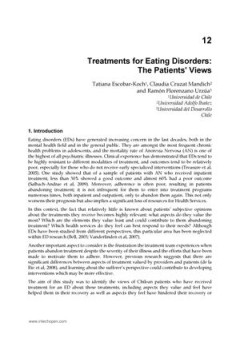
Treatments For Eating Disorders The Patients' Views
Treatments for Eating Disorders: The Patients' Views
- Edition
- -
- ISBN/ISSN
- 9789535100010
- Collation
- -
- Series Title
- -
- Call Number
- -
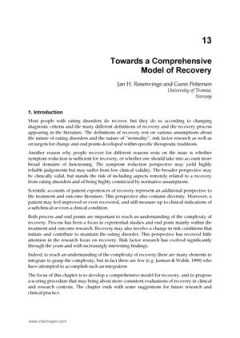
Towards a Comprehensive Model of Recovery
Towards a Comprehensive Model of Recovery
- Edition
- -
- ISBN/ISSN
- 9789535100010
- Collation
- -
- Series Title
- -
- Call Number
- -
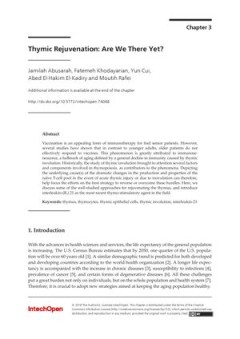
Thymic Rejuvenation Are We There Yet?
Vaccination is an appealing form of immunotherapy for frail senior patients. However, several studies have shown that in contrast to younger adults, older patients do not effectively respond to vaccines. This phenomenon is greatly attributed to immunosenescence, a hallmark of aging defined by a general decline in immunity caused by thymic involution. Historically, the study of thymic involution…
- Edition
- -
- ISBN/ISSN
- 9781789232523
- Collation
- -
- Series Title
- -
- Call Number
- -
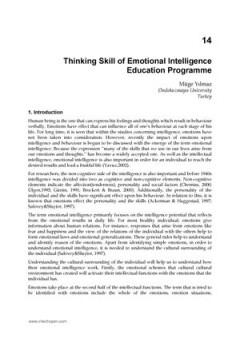
Thinking Skill of Emotional Intelligence Education Programme
Thinking Skill of Emotional Intelligence Education Programme
- Edition
- -
- ISBN/ISSN
- 9789533078380
- Collation
- -
- Series Title
- -
- Call Number
- -
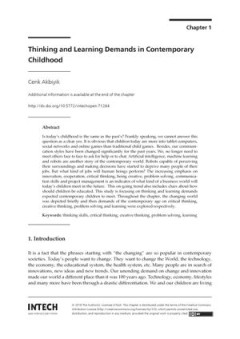
Thinking and Learning Demands in Contemporary Childhood
Is today’s childhood is the same as the past’s? Frankly speaking, we cannot answer this question as a clear yes. It is obvious that children today are more into tablet computers, social networks and online games than traditional child games. Besides, our communication styles have been changed significantly for the past years. We, no longer need to meet others face to face to ask for help or…
- Edition
- -
- ISBN/ISSN
- 9789535137382
- Collation
- -
- Series Title
- -
- Call Number
- -
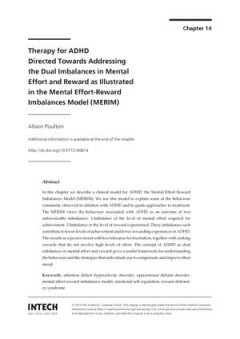
Therapy for ADHD Directed Towards Addressing the Dual Imbalances in Mental Ef…
In this chapter we describe a clinical model for ADHD: the Mental Effort Reward Imbalances Model (MERIM). We use this model to explain some of the behaviour commonly observed in children with ADHD and to guide approaches to treatment. The MERIM views the behaviour associated with ADHD as an outcome of two unfavourable imbalances: 1.Imbalance of the level of mental effort required for achievemen…
- Edition
- -
- ISBN/ISSN
- 9789535121664
- Collation
- -
- Series Title
- -
- Call Number
- -
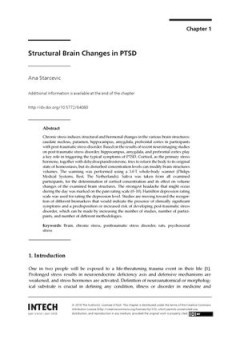
Structural Brain Changes in PTSD
Chronic stress induces structural and hormonal changes in the various brain structures: caudate nucleus, putamen, hippocampus, amygdala, prefrontal cortex in participants with post‐traumatic stress disorder. Based on the results of recent neuroimaging studies on post‐traumatic stress disorder, hippocampus, amygdala, and prefrontal cortex play a key role in triggering the typical symptoms of…
- Edition
- -
- ISBN/ISSN
- 9789535127284
- Collation
- -
- Series Title
- -
- Call Number
- -
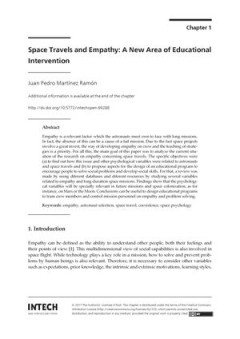
Space Travels and Empathy a New Area of Educational intervention
Empathy is a relevant factor which the astronauts must own to face with long missions. In fact, the absence of this can be a cause of a fail mission. Due to the fact space projects involve a great invest, the way of developing empathy on crew and the teaching of strategies is a priority. For all this, the main goal of this paper was to analyze the current situation of the research on empathy co…
- Edition
- -
- ISBN/ISSN
- 9789535134534
- Collation
- -
- Series Title
- -
- Call Number
- -
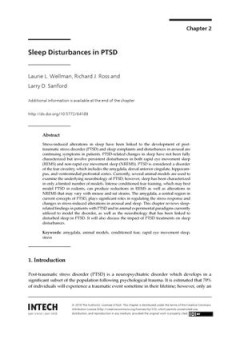
Sleep Disturbances in PTSD
Stress-induced alterations in sleep have been linked to the development of post-traumatic stress disorder (PTSD) and sleep complaints and disturbances in arousal are continuing symptoms in patients. PTSD-related changes in sleep have not been fully characterized but involve persistent disturbances in both rapid eye movement sleep (REMS) and non-rapid eye movement sleep (NREMS). PTSD is consider…
- Edition
- -
- ISBN/ISSN
- 9789535127284
- Collation
- -
- Series Title
- -
- Call Number
- -
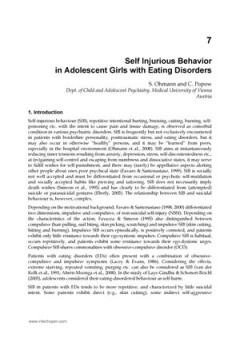
Self Injurious Behavior in Adolescent Girls with Eating Disorders
Self Injurious Behavior in Adolescent Girls with Eating Disorders
- Edition
- -
- ISBN/ISSN
- 9789535100010
- Collation
- -
- Series Title
- -
- Call Number
- -
 Computer Science, Information & General Works
Computer Science, Information & General Works  Philosophy & Psychology
Philosophy & Psychology  Religion
Religion  Social Sciences
Social Sciences  Language
Language  Pure Science
Pure Science  Applied Sciences
Applied Sciences  Art & Recreation
Art & Recreation  Literature
Literature  History & Geography
History & Geography